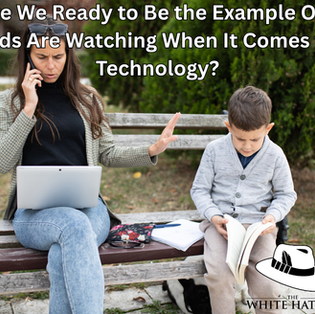Why Blanket Bans on Sexual Content in Schools Can Have Unintended Consequences
- The White Hatter

- Jul 11, 2025
- 3 min read
Caveat - We have noted that both here in Canada and elsewhere around the world, certain types of books and school curriculum that have been readily available are now being banned or prohibited, thus the reason for this article.

We recognize that efforts to restrict or limit sexual content in schools are often rooted in a desire to protect young people. The intention, in many cases, is understandable; parents and policymakers want to ensure students are exposed to age-appropriate material and feel safe in learning environments. However, based on our extensive experience delivering educational programs to schools across North America, we’ve observed that outright bans on anything that could be interpreted as sexual can lead to serious, unintended consequences.
One of the biggest concerns we’ve encountered relates to how these bans impact the ability to educate students on real-life issues like sexting, the sharing of nudes, digital consent, and even sexual assault. These are conversations that, by nature, involve discussions about human sexuality. Yet in some districts, we’ve heard from educators and students alike that new legislation or executive orders aimed at restricting sexual content have made it unclear, or even explicitly prohibited, whether these important topics can still be addressed in the classroom. Last year a Canadian school asked us to remove any content specific to sexting or sextortion from on of our presentations, given that they felt it would place them in jeopardy of violating a provincial mandate surrounding talking about any kind of sex education.
To be clear, we find it difficult to believe that the architects of these laws or policies intended to prevent students from learning how to protect themselves from online exploitation. But when the rules are written vaguely or applied too broadly, that’s sometimes the result. The issue isn’t just the intent of the policy, it’s how it’s interpreted and implemented at the ground level. When sexting education gets swept up in these restrictions, students are left without critical tools to navigate their online relationships safely.
We also need to think realistically about how students access information. Some policies focus heavily on banning or removing books or programs that include mature themes. But in our conversations with students, it’s clear that most aren't getting their information from books they check out of the library. They’re turning to Google, Reddit, TikTok, and YouTube. If they can’t learn about sexting and exploitation prevention in a structured, supportive school setting, they’ll likely seek answers on their own, often from sources that are incomplete, misleading, or outright harmful. One teen we spoke with told us they used the public library’s internet to privately research questions they were too afraid to ask at home or school. That story isn’t rare.
In response to these shifting regulations, we’ve made the decision to separate some of our core educational programs. In the past, topics like bullying, digital aggression, sexting, sextortion, and consent were often included within the same session. Going forward, we’ll offer these as separate, stand-alone modules. This approach allows us to respect the legal boundaries of schools or districts that are restricted from discussing sexually related topics, while still offering a pathway for those that can, and want to, engage students in conversations about digital consent, image sharing, and sexual exploitation.
We believe this new format not only meets the practical needs of schools working within legal limitations but also strengthens the quality of our educational offerings. By focusing more deeply on each topic, we can provide students with richer, more tailored learning experiences. For example, a dedicated session on sexting risk allows us to dig deeper into legal definitions, consent, emotional consequences, image permanence, peer pressure, and how to get help if something goes wrong, all without having to cut corners to make room for additional topics.
At the heart of all of this is a simple truth, kids need accurate, honest, and age-appropriate information about the online risks they face. Sweeping bans may feel like a protective measure, but they can end up creating blind spots that leave students less informed and more vulnerable.
Rather than asking whether schools should teach about sexting or digital consent, the better question is how these topics should be taught, and how we can ensure the education students receive is both effective and appropriate. That's where we’ll continue to focus our efforts.
Digital Food For Thought
The White Hatter
Facts Not Fear, Facts Not Emotions, Enlighten Not Frighten, Know Tech Not No Tech














